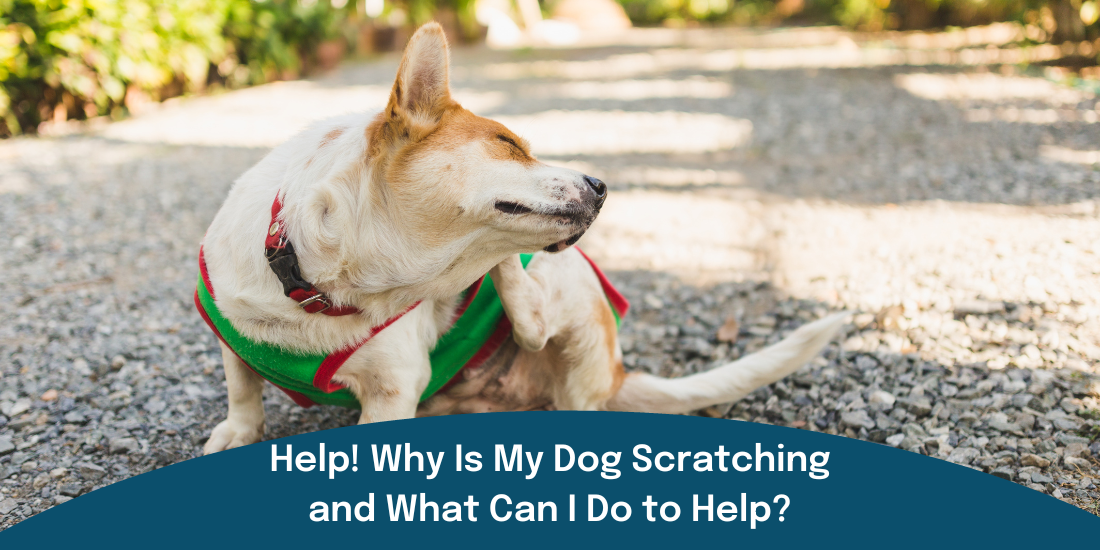
Help! Why Is My Dog Scratching and What Can I Do to Help Them?
|
|
Time to read 3 min
|
|
Time to read 3 min
Of course, all of us get an itch sometimes and need to scratch! But, when it’s your much-loved dog and you keep hearing that jangling of his collar tags as he has a good scratch yet AGAIN, or maybe you notice a bit of a ‘pong’ when you get close, it’s time to take action. There may be many different reasons why your dog is constantly scratching and one of the most obvious things for you to check – is your dog’s flea and tick prevention treatment up to date?
Itching could also be an indication of an underlying problem that your vet may need to investigate as itching is a symptom, not a physical disease, and your vet will take into consideration the age and breed of your dog, as some breeds do tend to have more problems. They will also ask if you've noticed whether something in particular seems to trigger the itching and what areas are affected.
One very common cause of endless itching in dogs is dermatitis. This condition, often resulting from allergies, fleas, or even dry skin, causes inflammation and irritation that can make your furry friend extremely uncomfortable.
If your dog is constantly scratching or showing signs of skin irritation, it could very well be dermatitis. So, don't let your pooch suffer in silence; take action and get them some relief.
Allergies can also cause itching and, unlike us humans who tend to sneeze or wheeze, your dog will often react with inflamed skin causing almost obsessive scratching, licking, chewing or rubbing their faces or bodies against the furniture!
Dogs can be allergic to a whole list of things including :
You may not even see them, but that doesn’t mean they’re not bothering your dog as fleas are a top reason for irritated skin. It’s helpful to wash your dog's bedding regularly and vacuum areas where they like to lay – to help break the flea lifecycle. Outdoors you could use a spray when going to specific areas where they like to play.
Yes, we know that though they may love to romp in muddy puddles, many dogs don’t like the bath! But, a regular warm (not too hot or cold) bath with a gentle doggy shampoo will not only wash away any allergens but also help keep their coat in good condition and smelling sweet.
No, we don’t mean ‘fancy dress’ but a clean t-shirt or similar will help stop chewing, leading to more irritation, and also keep some allergens away from his skin.
It may be your dog has an allergy to food so your vet may advise trying an elimination diet to see if there is a particular food, such as chicken or pork, causing your dog's itchy skin.
Always check with your vet first before trying this so your dog is still getting the correct nutrition but they may need a speciality food or even home-prepared diet.
A great way of helping your dog's itchy skin is to add a probiotic to their diet, such as our Super Tummy Daily Powder or Super Tummy Daily Chews.
90% of your dog's health is attributed to their gut so making sure they have a healthy digestive system is key to helping their overall health, including their skin. Probiotics help repair your dog's gut microbiome that can become out of balance for all sorts of reasons including diet or medicines, especially if they've needed antibiotics.
Some key benefits of supporting a healthier digestion by introducing probiotics include:
Maintaining your dog's health and well-being requires a holistic approach. It's not just about addressing the symptoms, but also about understanding the underlying causes.
By taking proactive steps and consulting with your vet, you can ensure that your dog is itch-free and happy. So next time you hear that jangling collar or notice the scratching, remember these tips from Buddy & Lola:
Your furry friend will thank you for it!